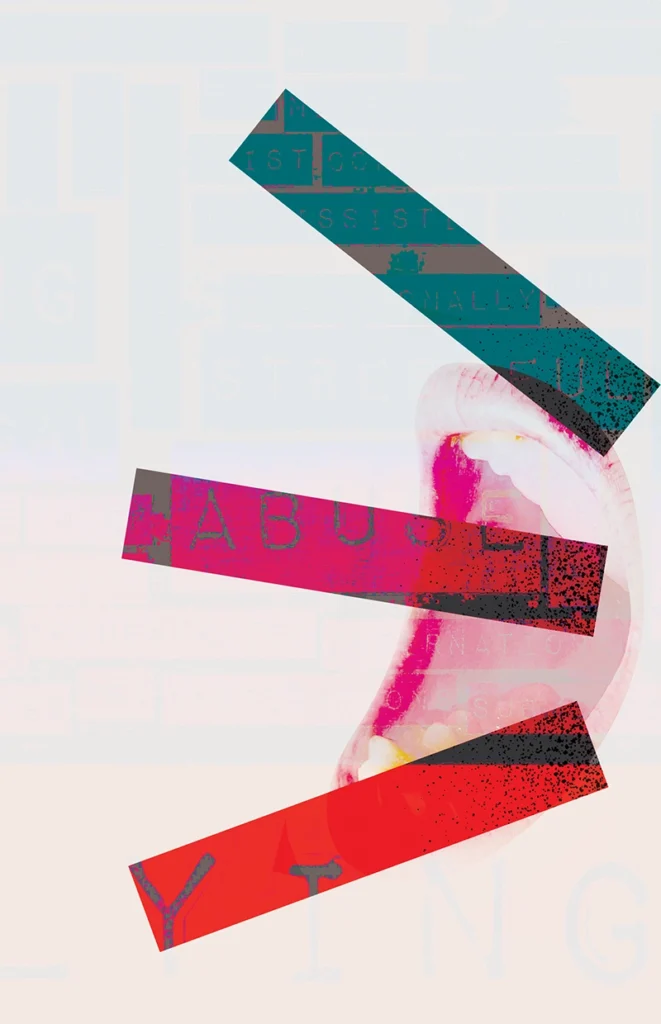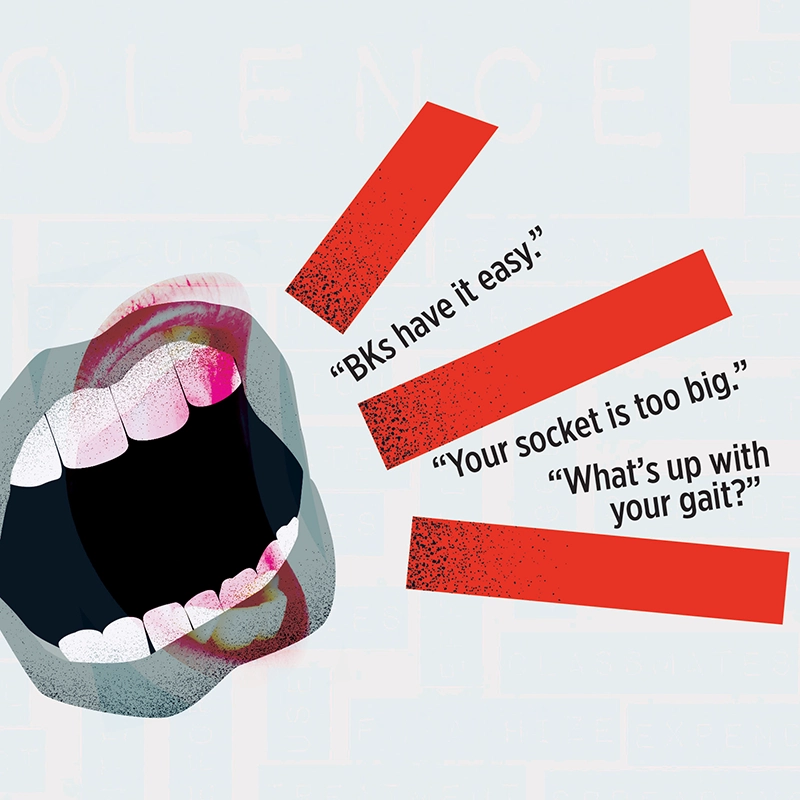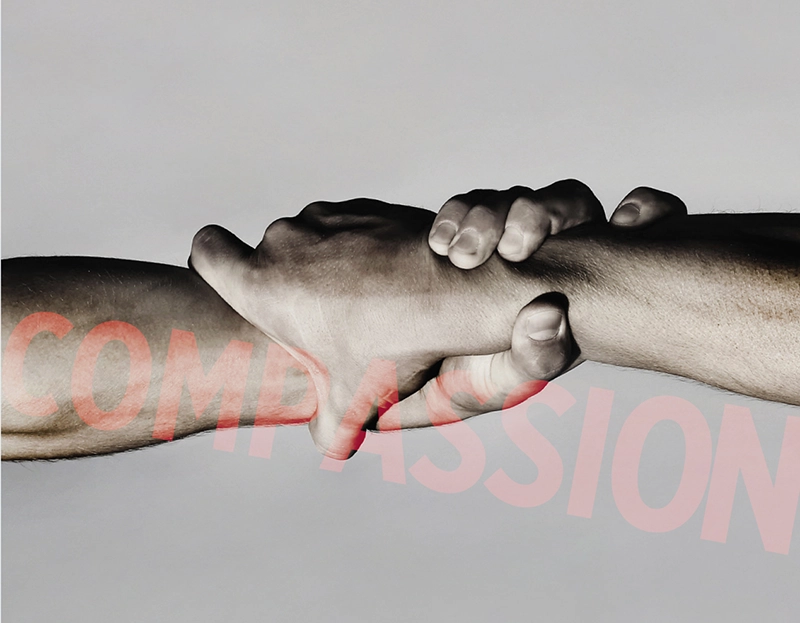When amputees take out our frustrations on each other, we damage what could be our greatest source of strength.
by Angelina Martinson
We get used to handling the stares, the awkward questions, and the “you’re so inspiring” comments from able-bodied people. That stuff almost becomes routine. What catches you off guard is when the criticism comes from someone who gets it—someone who’s lived through the same stuff you have. Another amputee.
And yet, that’s exactly what’s been happening. And not just to me.
Earlier this year, I wrote an Instagram post about the online attacks I routinely get from other amputees, not clueless trolls or strangers with no understanding of limb loss. The post struck a nerve. Hundreds of comments poured in from people who’ve experienced the same kind of hostility. I was shocked at how common this is.
It’s time we talk about it.
These are not just occasional messages. I get these kinds of comments in my social media channels daily, and they almost always show up under videos where I’m doing something active: hiking, lifting weights, walking my dog, getting in or out of the car. The very moments that show hard-won freedom, mobility, and independence are the ones that seem to bring out the greatest antagonism.
Sometimes the jabs are subtle: “Must be nice to be so lucky.” Other times, they’re direct and cruel: “Stop acting like you’re better than everyone.” “Try being an above-knee amputee and then talk to me.” “Stop showing off. This is unrealistic for 99% of amputees.”
And then there’s the line that gets under my skin every single time: “You’re lucky you’re just a below-knee.”
Lucky? My residual limb doesn’t bend fully. I’m missing internal anatomy because my amputation stemmed from a birth defect. The part of my leg I do have isn’t fully functional. And luck? I became an orphan because of my amputation. I lost my leg, my family, and my home—all before I could walk.
That isn’t luck. It’s resilience. Yet people still leave comments like this one: “I just don’t think below knee amps are that impressive. Lol maybe it’s the above-knee struggles in me hating. Sorry not sorry.”
I’ve ignored this behavior for a long time, thinking that if I just stayed positive, it might die down. But enough is enough. The way we talk to each other matters—not just for those of us creating content or living publicly, but for the entire amputee community. When an amputee comments that I, as a BKA, “have it easy,” it’s not just a direct attack on me. It says to every BKA who follows my socials: “Your pain doesn’t count. Your story isn’t valid.” I share my limb-loss experience online because it creates a powerful sense of connection. Negative comments have the opposite effect: They create a collective sense of rejection.
I believe in community. I believe in empathy. And I believe in calling out harmful behavior, even when it comes from within our own ranks. We’re not here to one-up each other. We’re here to understand each other, root for one another, and share in each other’s achievements. Instead of tearing each other down, we should be lifting each other up.
“These comments really make me sad,” another high-profile amputee content creator told me (they did not want to share their name). “I’ve always been supportive of all amputees. Super happy for others when they do amazing things. But I’ve often thought about quitting because of the amputee so-called community. It’s really sad. All you and I can do is try and build a community that will be a supportive one for the next generation. Well that is my hope.”
These attacks don’t come from nowhere. They come from frustration, grief, and a sense of isolation. And if we don’t talk about what’s fueling the bitterness, we’ll never get to the root of the problem.
Understanding the Pain Behind the Comments

kentoh/stock.adobe.com;
svetazi/stock.adobe.com
When I was growing up, in the long-forgotten days before social media, my mom used to tell me the bullies at school were only picking on me to ease their own insecurities. The same is true for online bullies. When we tear someone down, it’s often because we’re hurting. We project our own pain onto others. That’s human, but it’s also something we have to recognize and take responsibility for.
Here are some of the causes of the pain that spurs online bullying.
Unrealistic Timelines and Expectations
Many people expect to bounce back quickly from limb loss, especially if they’ve seen people online who seem to be thriving. If recovery takes longer than they expect, it’s easy to spiral into disappointment. Healing takes time. Getting comfortable with a prosthesis takes time. Learning to trust your new body with this new device takes time.
But instead of acknowledging that, some people turn their disappointment into disapproval of others. Instead of saying “I’m struggling,” they say “You’re showing off.” One social media commenter expressed this in a fairly sympathetic way: “I’m going on two years and I still have issues with walking. I push through as much as possible, but it’s frustrating and I feel like I’m failing. You are better than me.”
I’m sorry they’re struggling, but I’m not better and they’re not failing. I struggle, too. We all do. It’s natural to look at someone else’s life and wonder why yours doesn’t look the same. But comparison is the thief of joy, and nowhere is that more obvious than in the amputee space.
We’re not on a racetrack competing against each other. Lots of people can run faster, hike farther, and walk more gracefully than I can. That does not define me as a loser. It just means my path is different than theirs. If you aren’t running, hiking, or lifting weights to the same extent as someone else, it doesn’t mean you’re failing—and if you’re doing better than somebody else, it doesn’t mean you’re “winning.” It just means we’re all working toward our own goals. And ideally, we’re all helping each other move forward.
Ignoring Context
I’ve been an amputee for 30 years, so of course I move differently than someone who’s just a year out from surgery. But that nuance often gets lost online. People assume what they’re seeing is effortless. They don’t see the decades of physical therapy, trial and error, pain, infections, and mental health work behind every step.
Progress doesn’t look the same for everyone, especially when we’re all starting from different places. When someone writes, “You’re so lucky you can run, I can barely walk without being exhausted,” my response is: I’ve lost count of how many times other amputees have criticized my gait. Some just tell me how bad it looks; others get very specific about what I should be doing differently. Maybe they’re trying to be helpful, but it’s always painful to get unsolicited critiques from people who know exactly what you’re going through. Some amputees are able to walk with a near-natural gait, almost as if they had both legs. That’s amazing—but it’s not the reality for everyone. You never know what someone had to go through just to be walking again.
I was born without a tibia and had a clubfoot, so my gait was off even before my amputation. The leg I lost never had the full anatomy to begin with. All of those factors show up in every stride I take. But when I watch videos of myself walking, I don’t see imperfection—I see progress. I see grit. I feel proud. So it hurts to share the thing I’ve worked so hard for in an online space, only to have other people pick it apart. Yes, physical therapy can help, and yes, we can improve—but not everyone will have a textbook gait. Even after 30 years as an amputee, I still get self-conscious—and I look to other amputees to understand that insecurity and support me through it. Our gait is personal. It’s a visible reminder of everything we’ve survived. When people attack that, it cuts deep.

Gini Thomas, who’s had countless surgeries (including osseointegration) to address ongoing challenges with mobility, was once chided on social media: “Girl, you have NOT had more surgery than me!” The commenter went on to list all the major operations they had endured, then concluded rudely: “Annnnd I can still walk straighter than you.”
Technology “Advice”
There’s a strange way people tear each other down over prosthetic technology. People offering this type of feedback usually frame it as “just trying to help,” but it can come off as condescending or judgmental. The truth is, no prosthetic setup is one-size-fits-all. What works for one person may be a nightmare for another. But instead of recognizing that individuality, some people insist their way is the “right” way.
This kind of commentary doesn’t merely dismiss personal choice. It also invalidates the real process of trial and error we all go through. Worse, it implies that if you’ve chosen an unorthodox setup—even if it’s working for you—you’re doing something wrong or don’t know what you’re talking about. It turns an already complex journey into a competition of who’s the most savvy about tech.
Prosthetic devices are extremely user-specific. They are finely tuned to what works for YOU. Telling someone their device is garbage is more harmful than you think. A prosthesis isn’t just gear to me—it’s part of who I am and how I live. It’s how I move through the world, how I show up for the people I love, how I get to do what I do. When someone criticizes it, it doesn’t feel like they’re just talking about a piece of equipment—it feels like they’re questioning my effort, my choices, and even my worth.
I’ve had social media comments that ignore the content entirely and just randomly attack the appearance of my prosthesis. “Your socket is wayyyy too big,” somebody wrote. “Really wide and high side walls. You need to go to a professional, not whoever you claim to be going to.” Another person offered: “Pin & lock is the worst suspension. You need to find someone who can get you in the right suspension setup.”
These aren’t suggestions—they’re takedowns disguised as expertise. And they ignore the most important part: comfort and function are personal. We all have different limb architecture and pain points. We all have different access to care, funding, and technology. And even among people who have equivalent options, people are going to have different preferences. And that is OKAY! If you take vanilla, I take chocolate, and someone else has strawberry, we can all still be friends. We can share knowledge without making each other feel misinformed. We can trade insights without dismissing others’ opinions. If we really want to help each other, we have to let go of the idea that there’s only one “right” way to live with limb loss.
Confidence Seems to Be the Real Target
People assume I’ve never struggled. That’s because they don’t see the emergency surgeries, the organ failure, the days when I can’t get out of bed, the mental toll of lifelong comorbidities. They don’t see the toddler who lost her leg and her family at the same moment. They only see a video of me smiling during a hike.
Instead of trying to wipe that smile off my face, I wish they would do what I’ve always tried to do: Connect with people who understand how you’re hurting and why you’re hurting. Find people who’ll support you and get you smiling.
At first, I thought this kind of criticism—being called “fake,” “lucky,” or “attention-seeking” for simply showing up with confidence—was mostly aimed at women. But after talking to several male amputees, I’ve learned it’s not just a gender issue. Men in the limb-loss community are also getting hit with judgment online—told they’re showing off, exaggerating their abilities, or not “real” enough in their struggles. The criticism might show up differently, but the impact is the same.
New Rules of Engagement
If you’ve ever seen another amputee doing well and felt worse about yourself as a result, you’re not alone. But don’t externalize your pain and try to bring the other person down. That only hurts both of you. Try some of these strategies to elevate yourself and bring others with you.
• Acknowledge your own journey. Your struggle is real. You can be proud of your progress while still feeling frustrated over what’s holding you back. Give yourself credit for surviving, adapting, and persevering.
• Learn to advocate for better care. If something’s not working—your socket, your alignment, your mental health support—speak up. Find a provider who listens. You deserve to feel safe and seen in your body.
• Build, don’t break. If you feel envy or frustration bubbling up, ask yourself what you can learn from the person you’re watching. Can you reach out for advice? Can you be inspired instead of intimidated?

The person you’re attacking might be the exact person who understands you best—if you let them. The limb-loss community is small. We need each other. We are each other’s teachers, allies, mirrors, and safety nets. But when we attack each other, we damage what could be our greatest source of strength.
Amputees don’t need to agree on everything. We don’t need to live the same way. But we do need to lead with compassion. Because no one outside our community will ever understand us the way we understand each other. And that understanding should come with grace.
We don’t gain anything by tearing each other down, but we stand to gain everything by lifting each other up. Your pain is valid. Your progress is valid. Your struggle is real. So is mine. Let’s treat each other with the kind of compassion we all needed when we first lost a limb. Let’s be a community that sees people for who they are, not just how they move. One that holds space for different paths, different paces, different bodies.
Let’s do better—for each other, and for ourselves.
Angelina Martinson is a biomedical engineer specializing in medical devices and prosthetic technology. Follow her on Instagram at @adaptiveamputees.
Harden Your Armor
I’ve learned a few coping mechanisms to help me deal with negative feedback from other amputees. If you ever find yourself on the receiving end of unfriendly fire, try to remember:
It’s not about you.
People who are happy, healthy, and fulfilled don’t leave cruel comments. The person behind the keyboard is dealing with something you can’t see. That doesn’t excuse the behavior, but it can help you avoid taking their attacks personally.
Don’t feed the fire.
Engaging with someone who’s trying to provoke you almost never ends well. Block. Mute. Report. Protect your peace.
Share your truth, but set boundaries.
It’s okay to say, “That comment crosses the line.” It’s okay to call out patterns. Just don’t let someone else’s bitterness dim your light or shrink your presence. You don’t owe anyone silence to make them more comfortable.